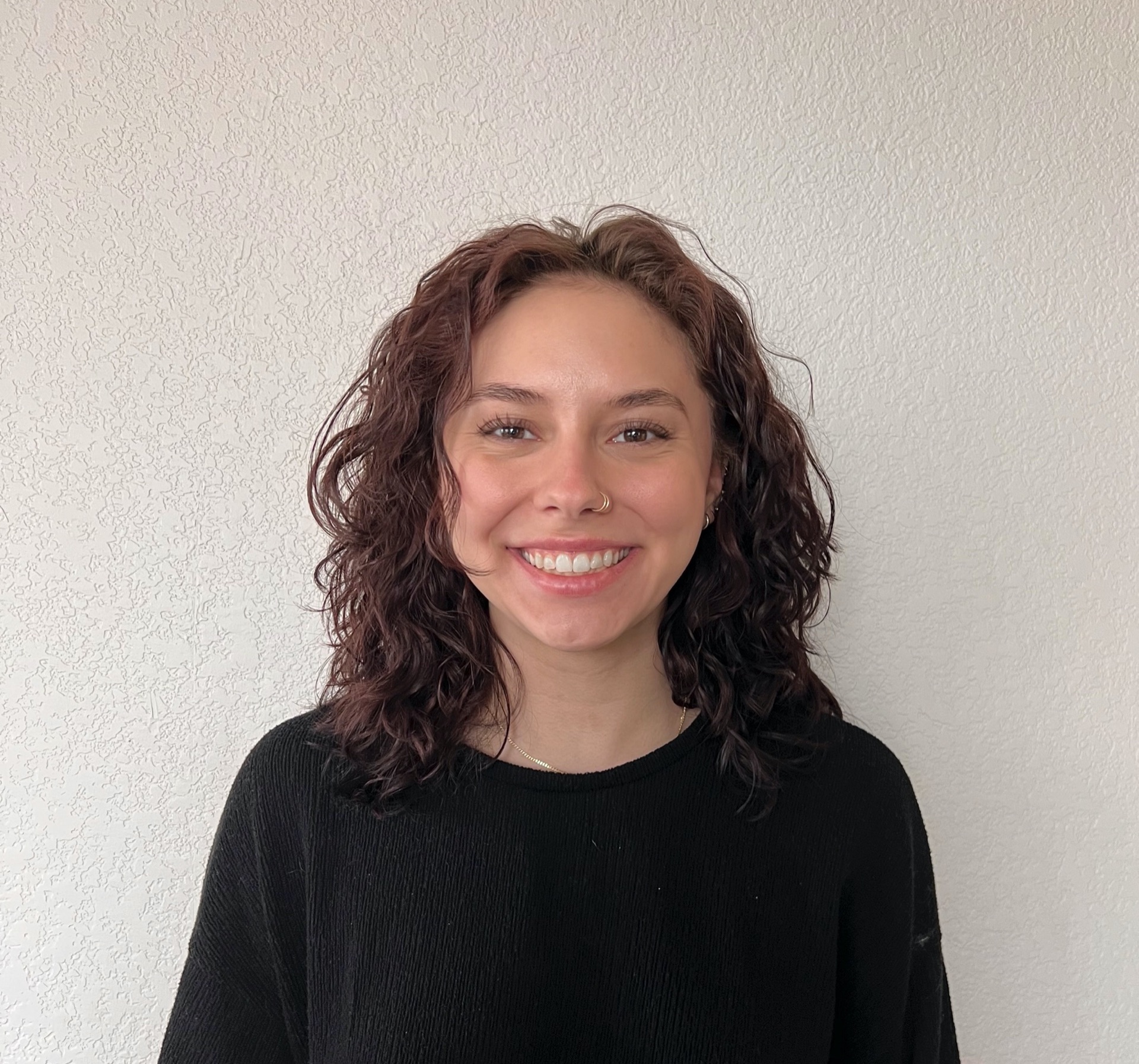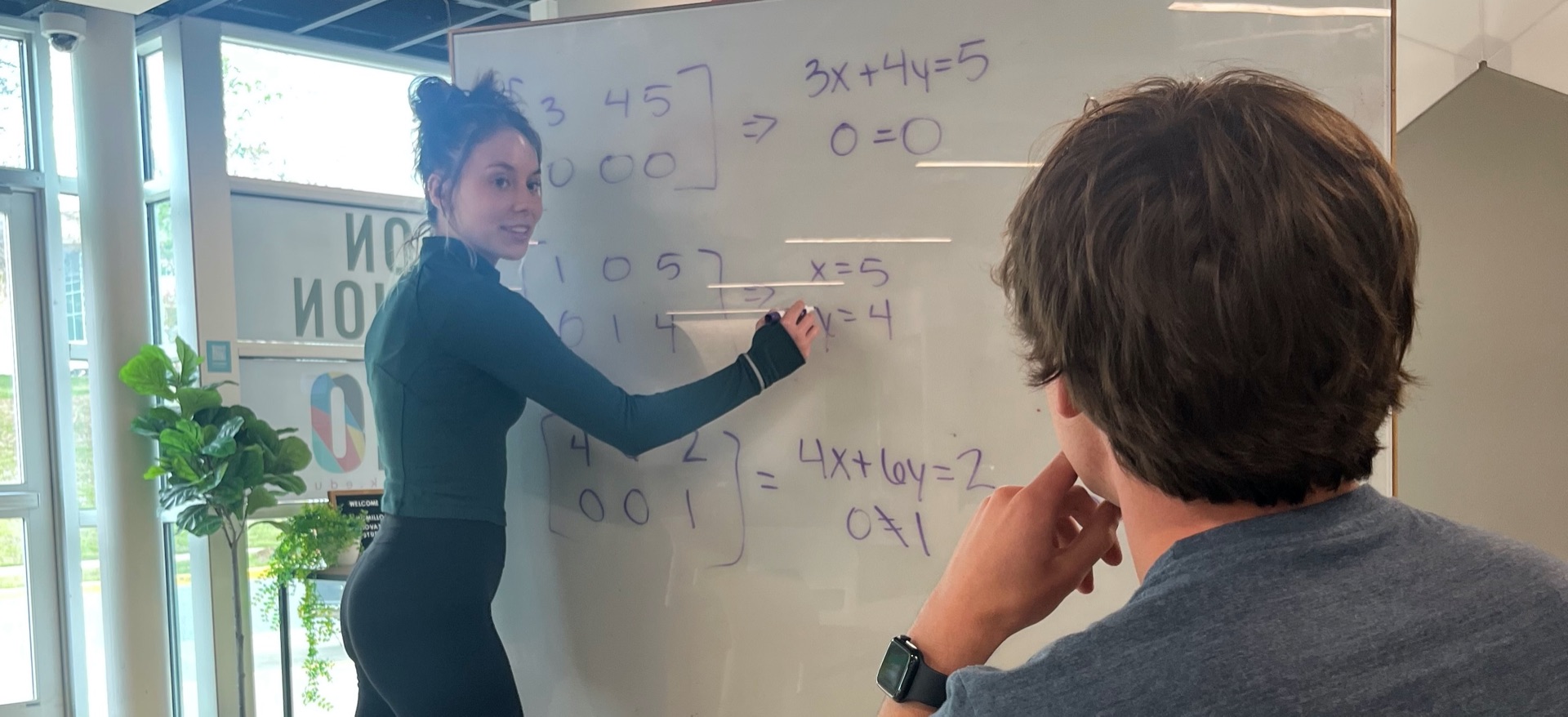Ryleigh Werner is a fourth-year Honors College Fellow from Flower Mound, Texas, majoring in business economics and minoring in supply chain management. Ryleigh’s thesis project examines Thrive Tutoring, the tutoring company she founded to offer academic support with the Business Core classes at Walton College.
 1. How and why did you get involved with tutoring? How and why did you get involved with tutoring?
1. How and why did you get involved with tutoring? How and why did you get involved with tutoring?
I tutored my friends and their friends while I was taking the Business Core classes. I also tutored in high school, and one day my goal is to be a professor here in the Department of Strategy, Entrepreneurship, and Venture Innovation. I love teaching people; it’s always fulfilling to see someone have the material click. A lot of students feel like they are behind their peers but in reality, they just need the material to be explained in a different way. I’ve experienced that feeling before in classes where I felt like I wasn’t very smart. I don’t just teach but encourage confidence in students to know they can succeed.
At Thrive Tutoring, we mainly tutor the hardest and prerequisite classes for Walton College business core. Finite Math is one of them, Accounting 1 & 2, Data Analysis or Calculus as well, and then Micro and Macroeconomics. Some business core classes can be taken anytime freshman or sophomore year; however, prerequisite classes need to be completed a particular semester or degree plan timeline is jeopardized. Prerequisites can be stressful for students if they drop a prerequisite class, not realizing they are now behind for graduation. The pressure builds as students must take a limited selection of faster-paced summer classes to catch up, then they must wait until that credit transfers to enroll in next semester’s classes–it just keeps building on the stress for students.
I had to figure this all out for myself. While the advisors want to help you, we’ve also had record breaking class sizes for the past three years, so of course things are going to fall through. And that’s what I always try to explain to students too: advisors are dealing with way more students than there used to, and you as a student ultimately have responsibility over your degree plan and your graduation timeline. I try to hold the students responsible and explain to them the university is trying to help you but you’re also an adult now.
2. How do you conduct tutoring sessions?
We do one-on-one private tutoring, and I also offer free tutoring on Sundays for Finite Math, Accounting I, and Survey of Calculus. I do that because honestly, I know it sounds so cheesy, but it really is important to me to be giving back to the community. I love the U of A, I love NWA. I’m involved in the Office of Entrepreneurship and appreciate the opportunities it has provided for me.
I’ve tutored many students who are paying for college themselves, or they have to pay all of their rent and don’t have their family’s support. A lot of independent students usually also need multiple sessions a week just because they’re probably not able to stay on top of their classes as they’re simultaneously working to pay for school. I don’t want the cost to build up for them and try to offer free test reviews on the weekends to help!
3. Have you noticed an impact that the tutoring has had on students?
What I look for with my tutors is of course people who are competent in the material, but I really look for people who like helping people. The tutors that want to do that will go above and beyond to make sure that they know material, and that makes them feel good. A big goal of mine that I tell my tutors is that I want them to feel like they’re valued. If you feel like you deserve higher pay, I want you to come talk to me. If you have a student who’s being disrespectful, I want you to tell me those things. I really focus a lot on value, and I think that’s kind of what’s missing in corporate America nowadays. People don’t really feel valued by their companies. But at the end of the day, a person is a person first: they have their job, but people want that personal connection.
That’s something I really try to ingrain with my tutors because that’s what I want their students feel too. When you’re tutoring people two or three times a week, you’re seeing them more than they see their own friends. You really become close with a lot of those students, and a lot of people will open up to you–of course, we keep things professional–but a lot of students will open up about the things that they’re struggling with. Just letting them know that there’s someone that cares, that wants them to succeed, that’s huge. That’s definitely what’s most important to me– having a good culture and making people feel valued.
4. As you near graduation, what do you see as the future for your tutoring company?
I’ll probably stay in Fayetteville. I love NWA. I’d really like to build out Thrive to be your go-to help for anything business-related in Walton College. I do like tutoring the business core but also would also love to help with degree planning. That was something that took me a lot to figure out for myself and I dabbled in a ton of different majors. I talk to students about that all the time because they’re always so stressed about picking their major and I always tell them they have time: I’ve changed my major four times.
So for the future of the business, I really want to be a part of the student experience here and also helping the parents. My own parents did not help me: they did not care about where I applied, never looked over any of my essays, never helped me with any of my degree planning. I just had to figure it all out for myself. And so I feel for a lot of the students who are also having to figure it out by themselves, and I love helping the parents who want to help. I really want to help people in a way that I wasn’t helped or be the person that I wish I had when I was younger. Mentorship is a big thing. For me. That’s why I run the freshman program here for the Office of Entrepreneurship and Innovation–to help students on the path of self-discovery and just know that you don’t necessarily have to follow the path that you thought you had to. And so that’s really where a lot of the heart for my company comes from is just being that person for people that I never really got help with.
5. How has this experience impacted your post college plans?
Next year, I’ll be doing the Masters of Science in finance with a focus on VC and angel investing here at the U of A. I’ve always wanted to stay in NWA for awhile. My dad is a serial entrepreneur so my initial post-college plans were to go help with the family business, but I’m not sure what that looks like at the moment.
I’ve always loved NWA and my tutoring company has really cemented me being here. It makes me feel fulfilled helping people and seeing the impact of what I’m doing on each of the students’ lives. Of course, I could go work in supply chain corporate or join the family company. But for me, I think that the most important thing is just having a job that makes you feel fulfilled. That’s something that I really push with students, especially like on the finance side of things, pick something that like makes you have more energy when you leave. I hear from a lot of investment bankers that they’re working like 80 to 100 hours a week and they’re just so drained. I feel like we just focus a lot on profits here in the U.S. and of course everyone wants to make a livable income, but also I think that there’s a trade-off between making a lot of money and not being happy with your life versus making a little less money but feeling super fulfilled.

